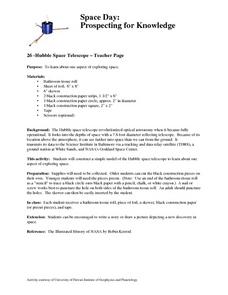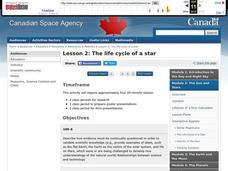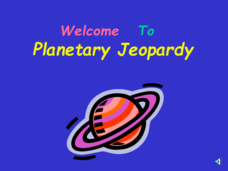Curated OER
Space Telescope Debate
Students investigate the Hubble and Webb telescopes. In this space telescope lesson, students research Internet sites to find out what type of information these telescopes provide. They debate whether it is financially responsible to...
American Museum of Natural History
Cosmic Connection
Do you see what I see? Individuals view eight images from the Hubble Space Telescope and then determine exactly what is being shown in the images. The pictures range from the rings of Saturn to views of billions of galaxies that take up...
Fluence Learning
Writing About Informational Text: Beyond the Beyond—Galaxies
Everyone has a different point of view, even when it comes to the enormity of the universe. Two separate text passages explain the scope of a galaxy, prompting young readers to write an essay about each author's argument and how the...
Curated OER
Hubble Space Telescope
Students investigate the history and use of the Hubble Space Telescope. They take a quiz in order to establish in any prior knowledge. Students conduct research to find information in conjunction with participating in class discussion...
Las Cumbres Observatory
Measuring the Age of the Universe
Just when is the universe's birthdate? Pupils use previously collected spectra data to find the redshift and radial velocity of supernovas. They then calculate the distance before finally creating a Hubble diagram. Finally, individuals...
Curated OER
Hubble Space Telescope Webquest
Young scholars research the Hubble Space Telescope. In this Hubble Space Telescope instructional activity, students complete a webquest about the Hubble Space Telescope.
Space Awareness
Coma Cluster of Galaxies
Scientists classify everything from the smallest cells to the largest galaxies, but how do they decide on a classification system? Scholars use 40 pictures of galaxies taken by the Hubble Space Telescope to sort and try creating their...
Curated OER
Spacing Out on the Internet
Young scholars explore and locate information about the universe using the Internet.
Curated OER
Spacd Day:Probing For Knowledge
Young scholars investigate the uses and purpose of the Hubble telescope. They create a model of the telescope and conduct research about the history behind the invention of it. Students use the information in order to create a context...
Curated OER
Pictures from Hubble Space Telescope
Students observe pictures taken by NASA's Hubble Space Telescope. From a given website, students observe images of the Einstein Cross, Black Eye Galaxy, Hoag's Object, merging and interacting galaxies and more. This lesson plan gives a...
Curated OER
Eye in the Sky
Students use the Internet to broaden their knowledge and understanding of the Hubble Space Telescope by participating in an Internet scavenger hunt, searching for information about the objectives, past successes and repair of the telescope.
Curated OER
Algebra: Mirror, Mirror on the Universe
Students assess how algebra, telescopes, space exploration and optics are so important in astronomy. They encounter studies on the Hubble Space Telescope, Hubble Deep Field and how algebra helps to determine the effects of contamination...
NASA
Space-Based Astronomy on the Internet
Young scientists compile everything they have learned into a report in the fifth and final lesson in a unit on the visible light spectrum. Access to photos from observatories, telescopes, and satellites allows learners to compare and...
Curated OER
The Relative Sizes of The Sun and Stars
For this relative sizes of the sun and stars worksheet, students determine the relative sizes of the Earth, Jupiter, the Sun and other stars. Students compare the size of stars given ratios of one star to another.
Curated OER
The Changing Atmosphere of Pluto
In this atmosphere of Pluto activity, students use an equation for the orbit of Pluto to determine the semi-major axis, the semi-minor axis, the ellipticity of the orbit, the aphelion and the perihelion. They also determine the predicted...
American Museum of Natural History
A Closer Look at Mars
A website looks at how we know so much about Mars—telescopes, robots, and spacecraft—and the search for martian life. Following the informational text are three questions that quiz pupils about possible life on Mars.
Curated OER
Telescopes Then And Now
In this telescopes worksheet, students will read information about the differences between the early telescopes and the modern telescopes. Then students will complete 2 short answer questions.
Messenger Education
Mission: Possible—How Can We Plan an Exploration of Another World?
An astronaut's spacesuit weighs 280 pounds and takes 45 minutes to put on — that's a serious suit! The second activity of a three-part series allows pupils to see all that goes into space exploration. Through simulations, groups analyze...
Curated OER
Worksheet 19: Ship Positions
In this math worksheet, learners read informational paragraphs and then answer 18 questions using data from their readings. Questions are about vectors, positions, distance and orbits.
American Museum of Natural History
Planetary Mysteries
Get to know our little part of the vast universe. Learners read about the common and not-so-common facts about each of the planets in the solar system. The interactive lesson includes a large amount of information as well as a quiz to...
Curated OER
Hubble Space Telescope
Young scholars investigate the universe through the eyes of the Hubble space telescope. They conduct research from looking at the universe that is simulated with a digital projector. The images are projected onto the wall in a simulation...
Curated OER
The Life Cycle of a Star
Students investigate the life cycle of a star and make conclusions based on evidence, research, and observation. In this lesson on space and scientific investigation, students describe the relationships between science and technology...
University of Colorado
Phases of Charon
Pluto, although no longer considered a planet, has five moons. Pluto's moon, Charon, is the focus of a resource that describes how the moon is viewed from the surface of Pluto. Photos help individuals see how Charon would look at...
Curated OER
Planetary Jeopardy!
Space Science can be so much fun, especially when you play Planetary Jeopardy! This game tests students on what they know about Roman Gods, the planets and moons in our solar system, and the Earth's rotation.

























